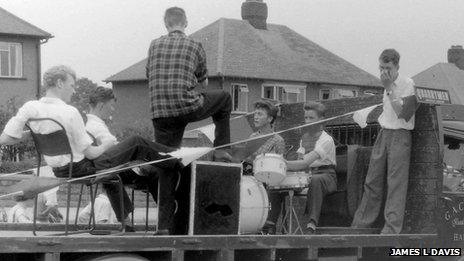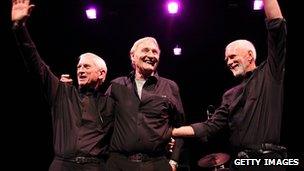Looking back at the birth of The Beatles
- Published

The Quarrymen, with John Lennon seated centre, pictured in 1957
The Beatles released their first single Love Me Do 50 years ago this week. Use the tabs above to read the stories of four people who played a part in the group's early days.
The Beatles started as The Quarrymen, a skiffle group formed by John Lennon and his friends at Quarry Bank school in Liverpool. They included Rod Davis, who played the banjo before being replaced by a certain Paul McCartney.
"We were all inspired by Lonnie Donegan's recording of Rock Island Line, which came out at the end of '55," Davis says. "I was inspired, as were tens of thousands of other kids in the UK, to pick up an instrument and try to thrash out a couple of chords.

The Quarrymen - (l to r) Colin Hanton, Len Garry and Rod Davis - reformed in 1997 and are still gigging
"I've been a teacher in my career and John was what you would call a disruptive pupil. Pete [Shotton, washboard] and Eric [Griffiths, guitar] both said John ruined their education with his fooling around. His one saving grace was that most of the things he got up to were actually very funny.
"He was a very good singer. But nobody in those days was a particularly good guitar player. He was very good at the front of a group. There was inevitably only one microphone and sometimes not even that, and John being the best singer, he got the microphone so the rest of us just joined in the chorus.
"Our first gigs were at St Peter's Youth Club - it was just an opportunity to be up on stage trying to impress the young ladies. And then we graduated to doing interval slots at school dances.
"We got the occasional party and then on one occasion we got to play at Lee Park Golf Club and in the audience was Alan Sytner, who owned the Cavern Club. As a result of that, we got into the Cavern. They had skiffle sessions.
"The others were all more into rock 'n' roll than skiffle, so when rock 'n' roll came along, we started playing a lot more rock 'n' roll numbers. But at that point, the Cavern was a jazz cellar. Skiffle was OK but rock 'n' roll was definitely not OK.
"If you played the wrong number in front of the wrong audience, they were liable to take exception, so you would get a note coming down saying 'Cut out the bloody rock'.
"I do remember on one occasion arguing with John about playing rock 'n' roll. I just thought it was causing us trouble. I personally didn't like rock 'n' roll at the time, which is one reason why I drifted out of the Quarrymen.
"At the end of the fifth year they all left school - I stayed on to the sixth form to try to get into university. So the group left me. I was still at school, they left, I was working hard for my A-levels and so I just drifted out.
"The group continued and met Paul McCartney, who knew an awful lot of song words, which were difficult things to get hold of, and could also play the guitar using proper guitar chords. He was a big asset to the group - a much bigger asset than I would have been and so they became more and more rock 'n' roll orientated, and that's how it happened.
"It wasn't a big deal as far as I was concerned - they weren't going anywhere anyway and I didn't like rock 'n' roll. You can't be a banjo player in a rock 'n' roll group. I was much more into blues and American country material and I've been playing that ever since.
"When I graduated at the end of '63, I went abroad and started working in Germany teaching English. My pupils had never heard of The Beatles so I got snippets from my mum and dad. I found a letter the other day saying 'You'll be pleased to hear your old mates are doing quite well'.
"I was out there when the Beatles really went big and there were no reverberations in southern Germany at all. So when I got back and found that they were seriously big time, I was absolutely delighted.
"I think Len [Garry, tea-chest bass] was the one who would have liked to have been a Beatle. He caught tubercular meningitis some time in 1958 and he was hospitalised for six months, and after that the last place they would let him go were smoky dives like The Cavern.
"He has said he felt really envious knowing they were out there enjoying themselves, playing music and impressing young ladies and he was working as an architect's apprentice in Liverpool. He was gutted but I wasn't too bothered at all."
The Quarrymen reformed in 1997 and will play The Castle pub on Finchley Road in London on 12 October.
- Published2 October 2012
- Published2 October 2012
- Published2 October 2012